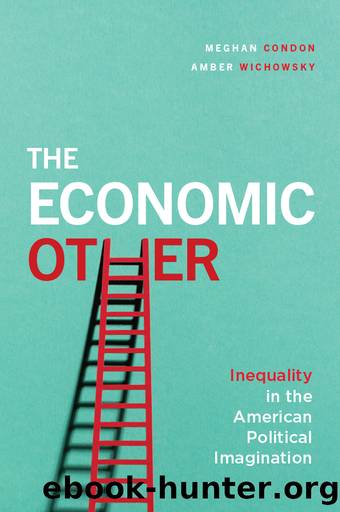The Economic Other: Inequality in the American Political Imagination by Meghan Condon & Amber Wichowsky

Author:Meghan Condon & Amber Wichowsky [Condon, Meghan & Wichowsky, Amber]
Language: eng
Format: epub
ISBN: 9780226691879
Google: u7jtDwAAQBAJ
Goodreads: 49414352
Publisher: University of Chicago Press
Published: 2020-01-15T08:26:48+00:00
There is a clear commercial benefit to casting the rich and famous as regular folk; like narratives that make the audience feel superior, this tack allows the audience to consume celebrity culture without feeling less-than. Athletes, actors, and other celebrities understand this strategy. Though the ordinary-person photographs for âStarsâTheyâre Just Like Us!â were once exclusively provided by intrusive paparazzi, who caught stars without makeup and couture, the photographs are now often taken by the celebrities themselves and posted on Instagram and other social media outlets.
Whether the celebrityâs goal is to sell endorsed products or promote their body of work, there is little to be gained from offering viewers and followers a social experience that feels demeaning. So, instead, wealthy celebrities, from actors to athletes, rely on mediated contact to encourage the audience to feel as though they are peers, even friends. The wealthy reality television star Kim Kardashian is perhaps the most skilled modern purveyor of such an image. In addition to several television programs, Kardashian reaches fans through her social media presence carefully crafted to make followers feel as though they are in a peer relationship with her. One study of her endorsement activities showed that though nearly half of the posts on her active Facebook account (in 2011) were product endorsements, a full third were about her family and friends, mimicking the type of activity followers would see on the Facebook pages of their own families and friends and creating an illusion that Kardashian was a peer.75 Kardashian is not alone. For example, a recent study of professional athletesâ social media behavior shows much the same thing, with a random sample of athletes from the NFL, NBA, MLB, and NHL âwilling to break down traditional barriers that once existed between themselves and the everyday fan . . . providing fans with unprecedented access to their lives.â76 These athletes talk about their personal lives more than sports on Twitter and often post simple, friendly conversational greetings to followers, like good morning messages.
Socially equalizing communication in this vein serves to create a parasocial relationship for the audience, a form of indirect contact in which a person feels and behaves as though she or he is in a real relationship with someone whom she or he has never actually met.77 Parasocial contact feels real, and is therefore quite powerful. But importantly for the questions we ask in this book, it does not produce discomfort like direct contact often does; this comfort contrast is particularly strong when the celebrity is a member of an out-group.78 As a result, parasocial relationships may reduce prejudice and bias when the celebrity or fictional character is a racial or sexual minority.79 The research on parasocial contact from which we are drawing here focuses exclusively on the reduction of racial, gender, and sexual prejudice when the parasocial relationship is with an intentionally positively portrayed, likable media figure, like the gay men on the popular television show Will and Grace, which debuted twenty years ago and has recently returned to the screen with new episodes.
Download
This site does not store any files on its server. We only index and link to content provided by other sites. Please contact the content providers to delete copyright contents if any and email us, we'll remove relevant links or contents immediately.
International Integration of the Brazilian Economy by Elias C. Grivoyannis(106941)
The Radium Girls by Kate Moore(12006)
Turbulence by E. J. Noyes(8011)
Nudge - Improving Decisions about Health, Wealth, and Happiness by Thaler Sunstein(7684)
The Black Swan by Nassim Nicholas Taleb(7092)
Rich Dad Poor Dad by Robert T. Kiyosaki(6583)
Pioneering Portfolio Management by David F. Swensen(6277)
Man-made Catastrophes and Risk Information Concealment by Dmitry Chernov & Didier Sornette(5987)
Zero to One by Peter Thiel(5772)
Secrecy World by Jake Bernstein(4732)
Millionaire: The Philanderer, Gambler, and Duelist Who Invented Modern Finance by Janet Gleeson(4451)
The Age of Surveillance Capitalism by Shoshana Zuboff(4272)
Skin in the Game by Nassim Nicholas Taleb(4228)
The Money Culture by Michael Lewis(4178)
Bullshit Jobs by David Graeber(4169)
Skin in the Game: Hidden Asymmetries in Daily Life by Nassim Nicholas Taleb(3983)
The Dhandho Investor by Mohnish Pabrai(3746)
The Wisdom of Finance by Mihir Desai(3722)
Blockchain Basics by Daniel Drescher(3570)
